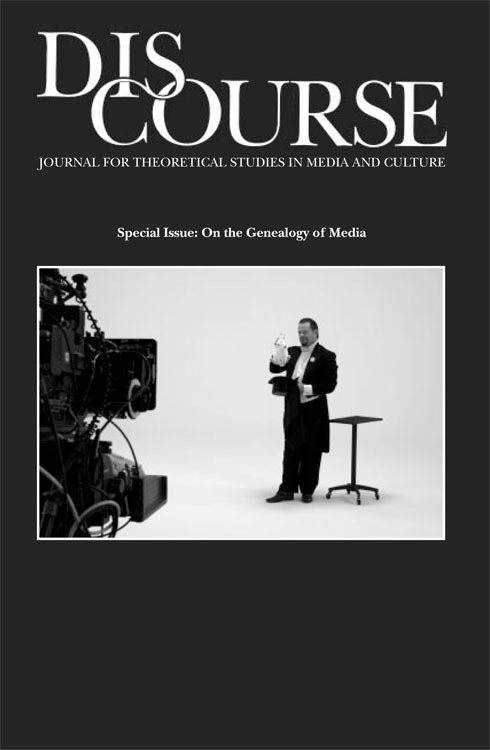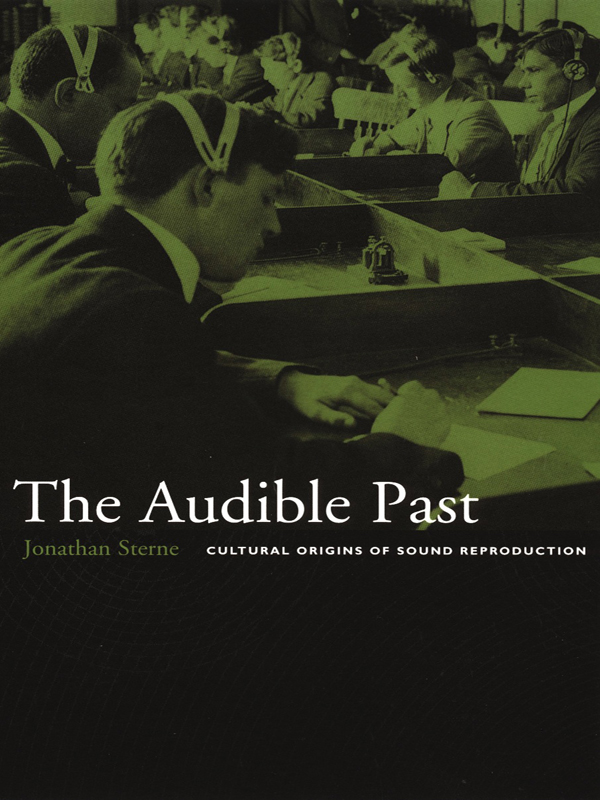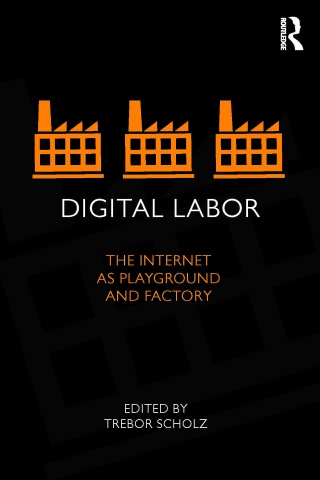Discourse 31(1/2): On The Genealogy of Media (2009)
Filed under journal | Tags: · media, media technology, media theory, mediality, philosophy, technology

“‘On the Genealogy of Media’ invokes a tradition for thinking about technology, which passes from Nietzsche through Heidegger and Freud. As a collection on media, however, these texts gathered together in this special issue include few Nietzsche readings—or even Nietzsche references—in their thread count. Indeed, Nietzsche is not typically considered a thinker of media technologies. But his genealogical interpretation of the Mass media as being on one uncanny continuum of valuation from Christianity to nihilism influenced, together with either Freud’s or Heidegger’s input, the media essays of Walter Benjamin as much as the media oeuvre of Friedrich Kittler. Following Nietzsche, then, a genealogy of media means, as in Heidegger’s questioning of technicity, that whatever technology may be it presupposes assumption of a certain (discursive) ready positioning for (and before) its advent as actual machines to which the understanding of technologization cannot be reduced. Freudian psychoanalysis views media technologies as prosthetically modeled after body parts and partings. A primary relationship to loss (as the always-new frontier of mourning where reality, the future, the other begin or begin again) is, on Freud’s turf and terms, the psychic ready position that is there before the event or advent of machinic externalities.” (from the Introduction)
With texts by Friedrich A. Kittler, Klaus Theweleit, Craig Saper, Gregory L. Ulmer, Rebecca Comay, Laurence A. Rickels, Barbara Stiegler, Tom Cohen and Avital Ronell.
Guest Editor: Laurence A. Rickels
Publisher Wayne State University Press, 2009
ISSN 1522-5321
182 pages
via Project Muse
Jonathan Sterne: The Audible Past: Cultural Origins of Sound Reproduction (2003)
Filed under book | Tags: · history of technology, listening, media technology, music, music history, phonograph, radio, sound, sound recording, technology, telegraphy, telephone

“The Audible Past explores the cultural origins of sound reproduction. It describes a distinctive sound culture that gave birth to the sound recording and the transmission devices so ubiquitous in modern life. With an ear for the unexpected, scholar and musician Jonathan Sterne uses the technological and cultural precursors of telephony, phonography, and radio as an entry point into a history of sound in its own right. Sterne studies the constantly shifting boundary between phenomena organized as “sound” and “not sound.” In The Audible Past, this history crisscrosses the liminal regions between bodies and machines, originals and copies, nature and culture, and life and death.
Blending cultural studies and the history of communication technology, Sterne follows modern sound technologies back through a historical labyrinth. Along the way, he encounters capitalists and inventors, musicians and philosophers, embalmers and grave robbers, doctors and patients, deaf children and their teachers, professionals and hobbyists, folklorists and tribal singers. The Audible Past tracks the connections between the history of sound and the defining features of modernity: from developments in medicine, physics, and philosophy to the tumultuous shifts of industrial capitalism, colonialism, urbanization, modern technology, and the rise of a new middle class.
A provocative history of sound, The Audible Past challenges theoretical commonplaces such as the philosophical privilege of the speaking subject, the visual bias in theories of modernity, and static descriptions of nature. It will interest those in cultural studies, media and communication studies, the new musicology, and the history of technology.”
Publisher Duke University Press, 2003
ISBN 082233013X, 9780822330134
450 pages
via nutzenberg
Reviews: James P. Kraft (American Historical Review), Karin Bijsterveld (Technology and Culture).
PDF (updated on 2022-12-7)
Comment (0)Trebor Scholz (ed.): Digital Labor: The Internet as Playground and Factory (2012)
Filed under book | Tags: · biopolitics, gift economy, internet, labour, neoliberalism, participation, play, playbour, politics, social media, technology, value, web, youtube

“Digital Labor calls on the reader to examine the shifting sites of labor markets to the Internet through the lens of their political, technological, and historical making. Internet users currently create most of the content that makes up the web: they search, link, tweet, and post updates—leaving their “deep” data exposed. Meanwhile, governments listen in, and big corporations track, analyze, and predict users’ interests and habits.
This unique collection of essays provides a wide-ranging account of the dark side of the Internet. It claims that the divide between leisure time and work has vanished so that every aspect of life drives the digital economy. The book reveals the anatomy of playbor (play/labor), the lure of exploitation and the potential for empowerment. Ultimately, the 14 thought-provoking chapters in this volume ask how users can politicize their troubled complicity, create public alternatives to the centralized social web, and thrive online.”
Contributors: Mark Andrejevic, Ayhan Aytes, Michel Bauwens, Jonathan Beller, Patricia Ticineto Clough, Sean Cubitt, Jodi Dean, Abigail De Kosnik, Julian Dibbell, Christian Fuchs, Lisa Nakamura, Andrew Ross, Ned Rossiter, Trebor Scholz, Tizania Terranova, McKenzie Wark, and Soenke Zehle.
Publisher Routledge, 2012
ISBN 0415896959, 9780415896955
258 pages
Reviews: Sebastian Sevignani (triple C, 2013), Andreas Wittel (Inf, Comm & Soc, 2014), Stephanie Anne Brown (Transformative Works & Cult, 2014), Gregory J. Downey (J Assoc Info Sci & Tech, 2015).
Conference (2009, from Archive.org)
Next conference (14-16 Nov 2014, CfP)
Publisher

